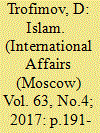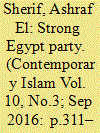|
|
|
Sort Order |
|
|
|
Items / Page
|
|
|
|
|
|
|
| Srl | Item |
| 1 |
ID:
016215


|
|
|
|
|
| Publication |
Spring 1993.
|
| Description |
114-127
|
|
|
|
|
|
|
|
|
|
|
|
|
|
|
|
| 2 |
ID:
155361


|
|
|
|
|
| Summary/Abstract |
THE WAVES OF DESTABILIZATION in the Middle East that have risen high in recent years, terrorist acts that follow one another, persecution of those who think differently or follow different religions in the Muslim countries and even outside them bring to mind, once more, Prof. Huntington. Indeed, can Islam and violence, Islam and democracy and, in the final analysis, Islamic and non-Islamic values cohabitate within the frames of the steadily globalizing community of men?
|
|
|
|
|
|
|
|
|
|
|
|
|
|
|
|
| 3 |
ID:
078414


|
|
|
|
|
| Publication |
2007.
|
| Summary/Abstract |
In this article, some conceptual and empirical relations between Islam, sovereignty, and democracy will be examined, with comparisons to Christianity. In the first part of the article, the historical conditions of the formation of the dualist (Christianity) and monist (Islam) political theories of the two religions will be examined. This will be followed by a conceptualization of the beginning and end of their respective "middle ages." It will be argued that the end of the Islamic middle ages was marked, in some Islamic countries, by the following phenomena: the building of a secular state apparatus; the replacement of "religion" by "nation" as the basis of the sovereignty of the new state; the deportation of Islam from the state to society; and the re-birth of Islam in the hands of the social actors as a political ideology aiming at re-capturing the state it had lost. In the final sections, the problematic relationship between secularization and democratization in the Islamic world will be examined, and the experiments with secularization in the Islamic world will be compared with those of France. It will be observed that what made secularization and democracy compatible in France was a combination of historical factors (the existence of the Church that controlled the social manifestations of religion; the state's success in nation-building; the efficiency of the secular judicial system; and the state's satisfactory performance in the area of socioeconomic development), which were largely absent in the Islamic contexts, with the possible exception of Turkey.
|
|
|
|
|
|
|
|
|
|
|
|
|
|
|
|
| 4 |
ID:
053426


|
|
|
|
|
| Publication |
London, I. B. Tauris, 2004.
|
| Description |
xii, 387p.
|
| Standard Number |
1850434255
|
|
|
|
|
|
|
|
|
|
|
|
Copies: C:1/I:0,R:0,Q:0
Circulation
| Accession# | Call# | Current Location | Status | Policy | Location |
| 048509 | 297.21/FAR 048509 | Main | On Shelf | General | |
|
|
|
|
| 5 |
ID:
148226


|
|
|
|
|
| Summary/Abstract |
Islamist parties espouse a socio-political platform that rests on the notion of creating an Islamic order and the application of the Islamic Sharia as a normative/legal and authoritative power structure. Progressive/Democratic Islamists is a term coined by some scholars to account for the emergence of new actors within the Islamic ranks starting from the 1990s in several Middle Eastern countries including Iran, Turkey, Egypt and North African countries. These actors depart from authoritarian political interpretations of Islamic texts, calling for a rationalist interpretation of Islamic idioms emphasizing the compatibility of Islam with democracy, pluralism, human rights and grassroots empowerment. This article analyzes the case of the Strong Egypt party (SEP) in the wake of the 2011 uprising in Egypt. It problematizes the identity of the party and its location in the ideological and political spectrum in Egypt. The article argues that the SEP claims a mixture of cultural conservatism, economic progressivism and political democracy, but that this mixture suffers from lack of depth, sophistication and a genuine social constituency and project.
|
|
|
|
|
|
|
|
|
|
|
|
|
|
|
|
|
|
|
|
|